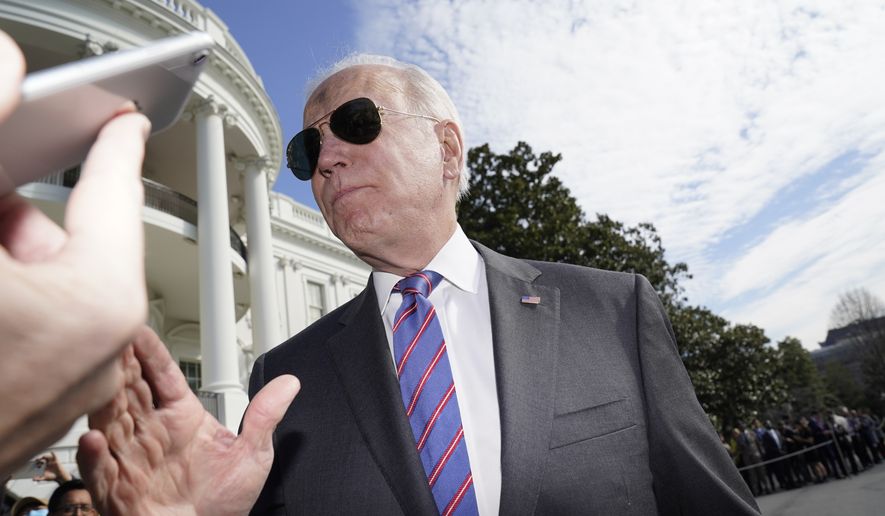A schism emerged among Democrats on Capitol Hill over whether the U.S. should move to ban Russian oil imports, underscoring the quagmire President Biden finds himself in when it comes to inflated gasoline prices.
A bipartisan movement to punish Russia, the world’s third-largest oil producer, for invading Ukraine by forcing the U.S. off Russian energy consumption has grown among lawmakers. Senators from both parties have filed similar legislation to halt Russian oil imports.
“The last thing I want to be doing is spending $1 on gas and oil for Russia,” Rep. Madeline Dean, a Pennsylvania Democrat, told The Washington Times. “But we have to make sure that the globe has the energy it needs, that America has the energy it needs.”
But amid rising prices at the pump and the likelihood that cutting off imports from Russia would mean further inflation for Americans, some Democrats are highly skeptical of the proposal. They’ve also floated concerns about the unintended consequence of hurting regular Russian citizens as opposed to oligarchs, given the country’s large amount of exports to other nations.
The U.S. received about 8% of its oil imports from Russia, or roughly 672,000 barrels a day, last year, according to the Energy Information Administration. Russia exports a total of about 5 million barrels per day.
Senate Majority Leader Charles E. Schumer, New York Democrat, said the amount of oil imported from Russia would be an insignificant impact on Moscow.
“That’s a very tiny amount, in terms of the whole world oil market,” he said this week.
Mr. Biden has avoided sanctioning Russia’s energy sector for fear of economic repercussions for both the U.S. and Europe, a continent that is dependent on Russia for oil and natural gas. But on Wednesday, he signaled an openness to the ban when he told reporters that “nothing is off the table.”
During his State of the Union address Tuesday night, Mr. Biden acknowledged that families’ pocketbooks have been hard hit by some of the highest inflation levels in decades. However, he declined to detail significant immediate steps that the administration would take to mitigate rising gasoline prices. The U.S. will release 30 million barrels from its reserves as part of a broader strategy from oil-producing countries around the world to hit Russia where it hurts most, but such a move has had minimal impacts on gasoline prices in the past.
A group of Republican senators and Sen. Ed Markey, a Massachusetts Democrat and a champion of the Green New Deal, have filed separate pieces of legislation to ban oil imports from Russia. Sen. Joe Manchin, a centrist Democrat from West Virginia, has also called for a ban.
The coalition of Republicans wants Mr. Biden to replace the immediate void from Russian oil with increased U.S. production via reversing his decision on the Keystone XL pipeline and approving more drilling on federal lands. Despite the Biden administration’s efforts to slow drilling, forecasts predict U.S. oil production levels will continue to grow to at least 12 million barrels per day within the next year.
The U.S. has not yet recovered to pre-pandemic levels of oil production.
Democrats, including Mr. Markey, want the U.S. to pivot toward a longer-term investment in clean energies. They say that prices and the geopolitical tensions abroad underscore why the U.S. should have made more investments in renewable resources long ago.
Oil strategists say Mr. Biden doesn’t have many remedies available to stem the increase in gasoline prices, a reality that the White House has also conceded. A ban or reduction in foreign oil imports is likely off the table due to the likelihood it would spur higher prices at the pump before domestic production could ramp up.
The average price of regular gasoline was around $3.65 per gallon as of Wednesday, an increase of more than 25 cents from a month ago, according to AAA. Oil markets were also trading higher, with U.S. oil benchmark WTI Crude up nearly 6% to $109 per barrel and global oil benchmark Brent crude up more than 6% to $111 per barrel.
Rick Tyler, a Republican strategist, argued that it would give Democrats political cover if they jump on board with a Russian oil ban.
“If he can unite the American people against Russia and then blame all of America’s domestic problems on the fact that we’re helping to preserve democracy in Ukraine and defeat Russia, I think that’s a winning political message,” Mr. Tyler said.
A Politico/Morning Consult poll released last week showed that while a majority of voters would blame Mr. Biden for further gasoline price hikes from America’s response to the war with Ukraine, even more said they would blame Russian President Vladimir Putin.
• Ramsey Touchberry can be reached at rtouchberry@washingtontimes.com.




Please read our comment policy before commenting.